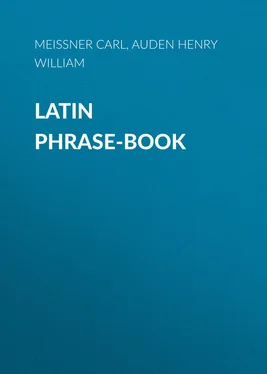Carl Meissner - Latin Phrase-Book
Здесь есть возможность читать онлайн «Carl Meissner - Latin Phrase-Book» — ознакомительный отрывок электронной книги совершенно бесплатно, а после прочтения отрывка купить полную версию. В некоторых случаях можно слушать аудио, скачать через торрент в формате fb2 и присутствует краткое содержание. Жанр: foreign_antique, foreign_prose, на латинском языке. Описание произведения, (предисловие) а так же отзывы посетителей доступны на портале библиотеки ЛибКат.
- Название:Latin Phrase-Book
- Автор:
- Жанр:
- Год:неизвестен
- ISBN:нет данных
- Рейтинг книги:5 / 5. Голосов: 1
-
Избранное:Добавить в избранное
- Отзывы:
-
Ваша оценка:
- 100
- 1
- 2
- 3
- 4
- 5
Latin Phrase-Book: краткое содержание, описание и аннотация
Предлагаем к чтению аннотацию, описание, краткое содержание или предисловие (зависит от того, что написал сам автор книги «Latin Phrase-Book»). Если вы не нашли необходимую информацию о книге — напишите в комментариях, мы постараемся отыскать её.
Latin Phrase-Book — читать онлайн ознакомительный отрывок
Ниже представлен текст книги, разбитый по страницам. Система сохранения места последней прочитанной страницы, позволяет с удобством читать онлайн бесплатно книгу «Latin Phrase-Book», без необходимости каждый раз заново искать на чём Вы остановились. Поставьте закладку, и сможете в любой момент перейти на страницу, на которой закончили чтение.
Интервал:
Закладка:
oppidum monti subiectum est – the town lies at the foot of a mountain.
promunturium in mare procurrit – a promontory juts out into the sea.
paeninsula in mare excurrit, procurrit – a peninsula projects into the sea.
promunturium superare – to double a cape.
urbs in sinu sita est – the city is situate on a bay.
2. Boundary – Territory – Distance
tangere, attingere terram – to be contiguous, adjacent to a country.
finitimum 15 15 vicinum esse , to be neighbouring; used of houses, gardens, etc.
esse terrae – to be contiguous, adjacent to a country.
continentem esse terrae or cum terra (Fam. 15. 2. 2) – to have the same boundaries; to be coterminous.
Gallia Rhodano continetur ( vid. sect. V. 4., note contineri aliqua re… ) – Gaul is bounded by the Rhone. 16 16 Transcriber's Note: the English original says "Gaul is bounded by the Rhine" which is wrong as can be seen both from the Latin expression and the original German edition.
Rhodanus Sequanos ab Helvetiis dividit – the Rhone. 17 17 Transcriber's Note: In the original book Auden translates Rhodanus Sequanos ab Helvetiis dividit wrongly as "the Rhine is the frontier between the Helvetii and the Sequani." The French and German versions correctly translate Rhodanus as "le Rhône" and "Rhone".
is the frontier between the Helvetii and the Sequani.
fines (imperii) propagare, extendere, (longius) proferre – to enlarge the boundaries of a kingdom.
(ex) finibus excedere – to evacuate territory.
in Sequanis – in the country of the Sequani.
in Sequanos proficisci – to invade the territory of the Sequani.
porrigi ad septentriones – to stretch northwards.
haec gens pertinet usque ad Rhenum – the territory of this race extends as far as the Rhine.
in latitudinem, in longitudinem patere – to extend in breadth, in length.
late patere 18 18 patere denotes extension in its widest sense; pertinere , extension from one point to another, e.g. ars et late patet et ad multos pertinet (De Or. 1. 55. 235); ex eo oppido pars ad Helvetios pertinet (B. G. 1. 6. 3).
(also metaphorically vid. sect. VIII. 8) – to have a wide extent.
imperium orbis terrarum terminis definitur – the empire reaches to the ends of the world.
longe, procul abesse ab urbe – to be far from town.
prope (propius, proxime) abesse – to be not far away.
paribus intervallis distare – to be equidistant.
tantundem viae est – the road is the same length.
longo spatio, intervallo interiecto – at a great distance.
intervallo locorum et temporum disiunctum esse – to be separated by an immense interval of space and time.
a mille passibus – a mile away.
e longinquo – from a distance.
loca longinqua – distant places.
ultimae terrae – the most distant countries, the world's end.
extremae terrae partes – the most distant countries, the world's end.
longinquae nationes – distant nations.
3. Road – Travel
viam sternere (silice, saxo) – to pave a road.
substruere viam glarea (Liv. 41. 27) – to make a gravel path.
via strata – a street, a made road.
via trita 19 19 tritus is also used figuratively, e.g. proverbium (sermone) tritum (De Off. 1. 10. 33), vocabulum latino sermone non tritum (Acad. 1. 7. 27).
– a well-trodden, much-frequented way.
viam munire 20 20 Cf. in metaphorical sense, viam ad honores alicui munire (Mur. 10. 23).
– to make a road.
viam patefacere, aperire – to open a route.
ferro viam facere (per confertos hostes) – to cut one's way (through the enemies' ranks).
viam intercludere – to obstruct a road; to close a route.
iter obstruere – to obstruct a road; to close a route.
via fert, ducit aliquo – a road leads somewhere.
in viam se dare – to set out on a journey.
viae se committere – to set out on a journey.
viam ingredi, inire (also metaphorically) – to enter upon a route; to take a road.
rectā (viā) – straight on.
de via declinare, deflectere (also metaphorically) – to turn aside from the right way; to deviate.
(de via) decedere alicui – make way for any one.
Appia via proficisci – to set out by the Appian road.
erranti viam monstrare – to direct a person who has lost his way.
errores Ulixis – the wanderings of Ulysses.
viam persequi (also metaphorically) – to continue one's journey, pursue one's course.
longam viam conficere – to accomplish a long journey.
fessus de via – weary with travelling; way-worn.
Hercules 21 21 vid. on this subject De Off. 1. 32. 118; Fam. 5. 12. 3.
in trivio, in bivio, in compitis – Hercules at the cross-roads, between virtue and vice.
iter facere – (1) to take a journey, (2) to make, lay down a road (rare).
una iter facere – to travel together.
iter ingredi (pedibus, equo, terra) – to begin a journey (on foot, on horseback, by land).
iter aliquo dirigere, intendere – to journey towards a place.
tendere aliquo – to journey towards a place.
longum itineris spatium emetiri – to finish a very long journey.
ex itinere redire 22 22 reverti means properly to turn back and retrace one's steps, after giving up one's intention of remaining longer in a place, or continuing one's journey, cf. Div. 1. 15. 27, itaque revertit ex itinere, cum iam progressus esset multorum dierum viam . Similarly reditus = return, reversio generally = turning back. Cicero only uses revenire in conjunction with domum .
– to return from a journey.
in itinere 23 23 ex itinere implies that the march was interrupted, thus there is a difference between in itinere aliquem aggredi and ex itinere , etc. In the same way distinguish in fuga and ex fuga , e.g. ex fuga evadere, ex fuga dissipati .
– on a journey; by the way.
iter terrestre, pedestre – travel by land, on foot.
itinera diurna nocturnaque – travelling day and night.
iter unius diei or simply diei – a day's journey.
iter impeditum – an impassable road.
disiunctissimas ultimas terras peragrare (not permigrare ) – to travel through the most remote countries.
peregrinatio – a foreign journey.
peregrinari, peregre esse – to be travelling abroad.
peregre proficisci – to go abroad.
aliquem proficiscentem prosequi – to accompany any one when starting; to see a person off.
aliquem proficiscentem votis ominibusque prosequi ( vid. sect. VI. 11, note Prosequi… ) – to wish any one a prosperous journey.
rus excurrere – to make a pleasure-trip into the country.
ruri vivere, rusticari – to live in the country.
vita rustica – country life (the life of resident farmers, etc.)
rusticatio, vita rusticana – country life (of casual, temporary visitors).
Читать дальшеИнтервал:
Закладка:
Похожие книги на «Latin Phrase-Book»
Представляем Вашему вниманию похожие книги на «Latin Phrase-Book» списком для выбора. Мы отобрали схожую по названию и смыслу литературу в надежде предоставить читателям больше вариантов отыскать новые, интересные, ещё непрочитанные произведения.
Обсуждение, отзывы о книге «Latin Phrase-Book» и просто собственные мнения читателей. Оставьте ваши комментарии, напишите, что Вы думаете о произведении, его смысле или главных героях. Укажите что конкретно понравилось, а что нет, и почему Вы так считаете.

![Рис Хьюз - Madonna Park[e-book - рассказы]](/books/94285/ris-hyuz-madonna-park-e-book-rasskazy-thumb.webp)










